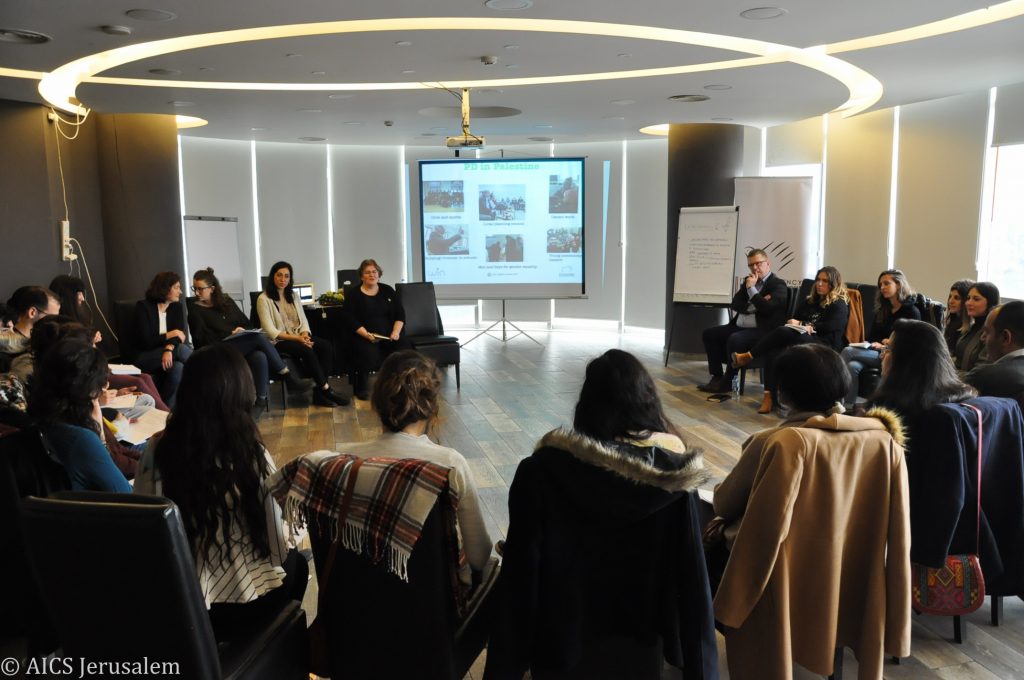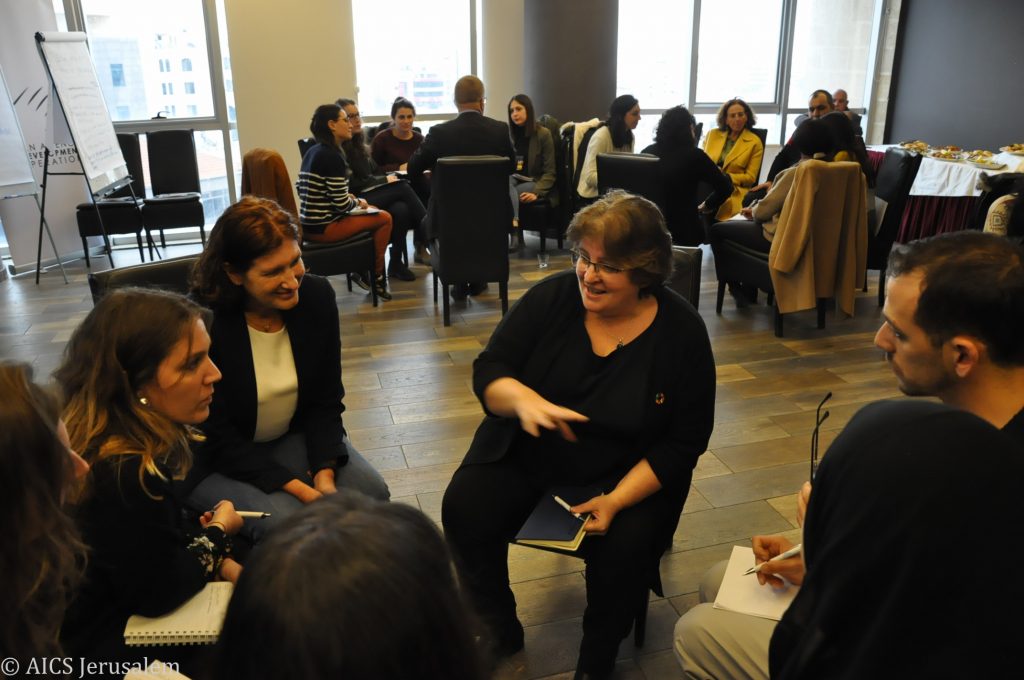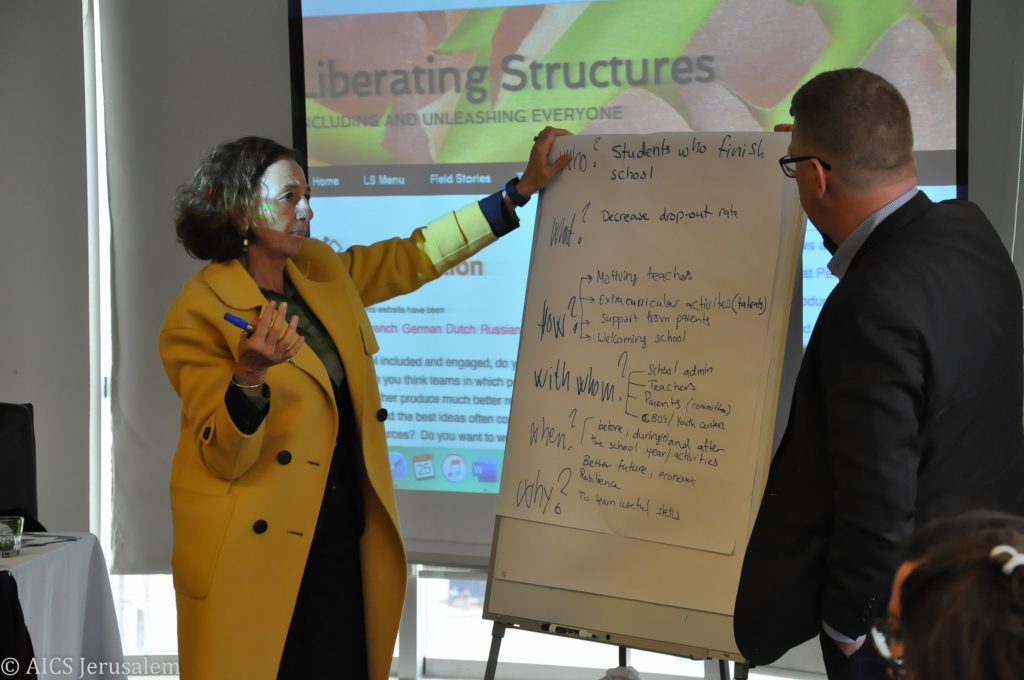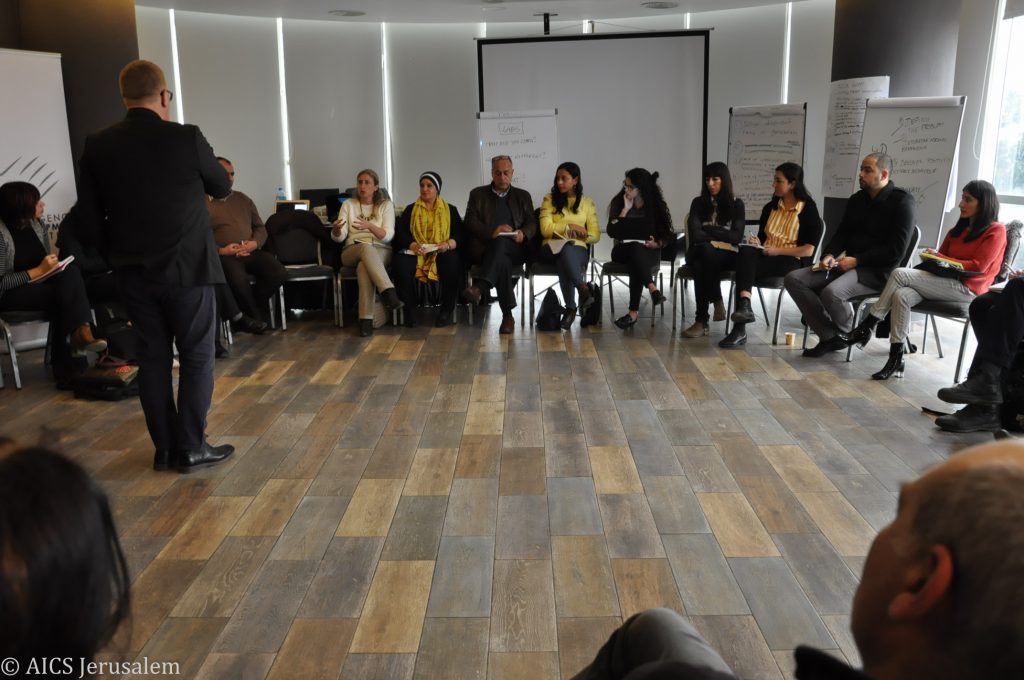A 2-days workshop organized by AICS Jerusalem on positive deviants and adaptive leadership in Ramallah
Dorthe, Lars and Lavinia know very well the Palestinian context and the development cooperation activities in West Bank, East Jerusalem and Gaza. They already implemented workshops here and they successfully disseminated the peculiar approach and methodology they are going to share in this occasion with the Italian Agency for Development Cooperation’s partners: positive deviance and adaptive leadership.  Which means flexibilty in the operational environments, strong participation of the local communities to the identification and implementation processes, provision of adaptive tools and perspectives to the leaders. It seems raw theory but real issues are challenged here, how the development experts can leave the suit of helpers coming from the “first world” in order to participate with local partners at a different level – collaborative, engaging, equal.
Which means flexibilty in the operational environments, strong participation of the local communities to the identification and implementation processes, provision of adaptive tools and perspectives to the leaders. It seems raw theory but real issues are challenged here, how the development experts can leave the suit of helpers coming from the “first world” in order to participate with local partners at a different level – collaborative, engaging, equal.
The workshop begins changing the seats position, we need a circular shape able to re-gather itself in small working groups and then discuss in details a revolutionary change of mind-set, an empty space to host the positive deviance overthrowing. Representatives from Italian, international and Palestinian civil society organizations participate to this exercise, in addition to – the second day – UN Agency workers in Palestine that have already adopted the positive deviance approach in the project management cycle and are willing to share their experience.
 The difficulties of Palestinians are there, we are ready to tackle them, and we can look at them in two kinds: the lack of a service or the replication of a damaging behavior. The second category can be faced using the positive deviance approach, the pursuit of Champions – virtuous but common customs, that you can analyze with the communities and then replicate. This is a new tactic putting the community in the middle of the process: they make the questions, they give the answers, they select the proper indicators. A best practice is something different, Dorthe underlined: a particular behavior to show, not an alternative and ordinary custom, hidden, that we can disseminate to enhance the general conditions of the community.
The difficulties of Palestinians are there, we are ready to tackle them, and we can look at them in two kinds: the lack of a service or the replication of a damaging behavior. The second category can be faced using the positive deviance approach, the pursuit of Champions – virtuous but common customs, that you can analyze with the communities and then replicate. This is a new tactic putting the community in the middle of the process: they make the questions, they give the answers, they select the proper indicators. A best practice is something different, Dorthe underlined: a particular behavior to show, not an alternative and ordinary custom, hidden, that we can disseminate to enhance the general conditions of the community.
 We are plenty of perfect examples, one for all. Vietnam, child malnutrition, early 90s. The positive deviance approach is adopted to understand how some children, facing similar hard life conditions, suffer for malnutrition less than the other community young members. The survey, leaded by the right question (are there any children with good nutrition coming from families vulnerable as well?), tells that some good behaviors made this possible: parents added shrimps and lobsters in the meals, full of proteins, or sweet potatoes leaves while other parents ignored their nutritional value, or again parents gave to the kids more than just two meals per day, or again they took care of them during the nutrition, avoiding waste of food. Once shared with the rest of the community, these far-from-the-norm behaviors allowed a real knowledge sharing and a direct and productive impact for the problem solving. That’s how positive deviants can help development cooperation.
We are plenty of perfect examples, one for all. Vietnam, child malnutrition, early 90s. The positive deviance approach is adopted to understand how some children, facing similar hard life conditions, suffer for malnutrition less than the other community young members. The survey, leaded by the right question (are there any children with good nutrition coming from families vulnerable as well?), tells that some good behaviors made this possible: parents added shrimps and lobsters in the meals, full of proteins, or sweet potatoes leaves while other parents ignored their nutritional value, or again parents gave to the kids more than just two meals per day, or again they took care of them during the nutrition, avoiding waste of food. Once shared with the rest of the community, these far-from-the-norm behaviors allowed a real knowledge sharing and a direct and productive impact for the problem solving. That’s how positive deviants can help development cooperation.
 The second part of the workshop allows to put on the table the real problems of the Palestinian society that the different AID workers face in their daily work. Now they can try to adopt the alternative light that Lars, Dorthe and Lavinia provided them. Participants re-gather themselves in small groups to share problems and possible solutions, discussing them with small and large group, acknowledging mutual opinions. You can feel curiosity and satisfaction, nobody is silent, even confrontations are most welcome and useful.
The second part of the workshop allows to put on the table the real problems of the Palestinian society that the different AID workers face in their daily work. Now they can try to adopt the alternative light that Lars, Dorthe and Lavinia provided them. Participants re-gather themselves in small groups to share problems and possible solutions, discussing them with small and large group, acknowledging mutual opinions. You can feel curiosity and satisfaction, nobody is silent, even confrontations are most welcome and useful.
Hoping in the possible follow-ups of the mission, we thank and greet Lars, Dorthe and Lavinia, that taught us to question ourselves upside down, to overthrow the point of view and to look at the water in the glass without wasting time with the emptiness around it.
